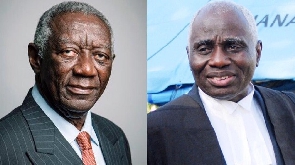Tsatsu Tsikata, former CEO of the Ghana National Petroleum Corporation (GNPC), recently shared his reasons for rejecting a presidential pardon offered by former President John Agyekum Kufuor on Kufuor’s final day in office.
Speaking to KSM on the KSM Show, Tsikata explained that he was determined to seek justice through the courts to clear himself of charges of willfully causing financial loss to the state. He had no interest in a pardon that would not nullify his conviction.
On January 6, 2009, while hospitalized at Korle-Bu Teaching Hospital due to an asthma attack, Tsikata penned a two-page letter to President Kufuor, rejecting the presidential pardon. He wrote: “I have never sought, and I do not need your pretense of mercy. Justice is my quest, and I will pursue this quest in accordance with the constitution and laws of Ghana.”
Tsikata expressed his disdain for the pardon, calling it hypocritical, since, according to him, Kufuor was instrumental in his prosecution. “Your apparent exercise of the presidential prerogative of mercy in respect of a conviction and imprisonment which you were the prime mover of is the height of hypocrisy,” Tsikata wrote.
He continued, asserting that the injustice committed against him by the Fast-Track High Court on June 18, 2008, had been initiated by Kufuor’s administration in 2001 under then Attorney-General Nana Akufo-Addo. Tsikata argued that Kufuor’s attempt at a last-minute pardon was an inappropriate interference with ongoing judicial processes, carried out in bad faith.
He quoted Psalm 94:15, writing to Kufuor: “Justice will again be found in the courts, and all righteous people will support it.”
Reflecting on the event 13 years later, Tsikata said to KSM, “I think I said it nicely. I wrote him a letter on my hospital bed and I said I would not accept his pardon; and I wouldn’t accept it. By then, I already had an appeal pending against the decision that had been taken. I wanted to be vindicated, not pardoned. When you are pardoned, it means that your conviction still stands, but the penalty has been wiped away.”
After years of legal battles, Tsikata’s conviction was ultimately overturned by the Court of Appeal, which acquitted and discharged him. Justice Dennis Adjei ruled that there had been a miscarriage of justice when the Fast-Track High Court found Tsikata guilty on three counts of willfully causing financial loss to the state and misapplying public property.
Upon his acquittal, Tsikata once again quoted Psalm 94:15, reaffirming: “Justice will again be found in the courts, and all righteous people will support it.” He expressed his satisfaction with the outcome, emphasizing that justice had indeed prevailed.

